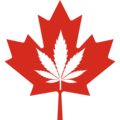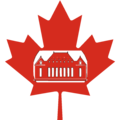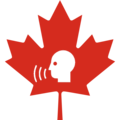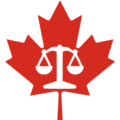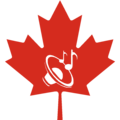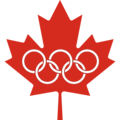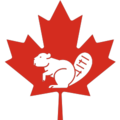Portal:Canada
| Showcase | Contents | Contributing |
Introduction
Canada is a country in North America. Its ten provinces and three territories extend from the Atlantic Ocean to the Pacific Ocean and northward into the Arctic Ocean, making it the world's second-largest country by total area, with the world's longest coastline. Its border with the United States is the world's longest international land border. The country is characterized by a wide range of both meteorologic and geological regions. With a population of just over 41 million people, it has widely varying population densities, with the majority residing in urban areas and large areas of the country being sparsely populated. Canada's capital is Ottawa and its three largest metropolitan areas are Toronto, Montreal, and Vancouver.
A developed country, Canada has a high nominal per capita income globally and its advanced economy ranks among the largest in the world by nominal GDP, relying chiefly upon its abundant natural resources and well-developed international trade networks. Recognized as a middle power, Canada's support for multilateralism and internationalism has been closely related to its foreign relations policies of peacekeeping and aid for developing countries. Canada promotes its domestically shared values through participation in multiple international organizations and forums. (Full article...)
Featured article -

The Yukon Quest, formally the Yukon Quest 1,000-mile International Sled Dog Race, is a sled dog race scheduled every February since 1984 between Fairbanks, Alaska, and Whitehorse, Yukon, switching directions each year. Because of the harsh winter conditions, difficult trail, and the limited support that competitors are allowed, it is considered the "most difficult sled dog race in the world", or even the "toughest race in the world"—"even tougher, more selective and less attention-seeking than the Iditarod Trail Sled Dog Race." The originator envisioned it as "a race so rugged that only purists would participate." (Full article...)
Current events
- April 28, 2025 – 2025 Canadian federal election
- Voters in Canada go to the polls to elect the 343 members of the House of Commons to the 45th Canadian Parliament. (BBC)
- The Liberal Party under leader Mark Carney is projected to form a government for a fourth consecutive mandate, with Carney remaining prime minister. (The Globe and Mail)
- Conservative Party leader Pierre Poilievre and New Democratic Party leader Jagmeet Singh each make speeches conceeding the election, with Singh announcing his intention to resign as party leader. (CTV News)
- April 27, 2025 – 2025 Vancouver car attack
- The death toll from yesterday's vehicle-ramming attack at a street festival in Vancouver, British Columbia, Canada, rises to eleven with at least 20 others injured, making the attack tied for the deadliest vehicle-ramming attack in Canadian history. The British Columbia Prosecution Service charges the perpetrator with eight counts of second-degree murder, while investigators also rule out terrorism. (CTV News) (AP)
- April 26, 2025 – 2025 Vancouver car attack
- Nine people are killed and several others injured, after a car is driven through a crowd at a Philippine-Canadian festival in Vancouver, British Columbia, Canada. (Al Jazeera)
- April 25, 2025 –
- A Royal Thai Police Viking DHC-6 Twin Otter aircraft crashes while conducting a test flight for parachuting training near Hua Hin Airport in Prachuap Khiri Khan, Thailand, killing all six people on board. (The Nation) (AP)
Selected panorama -
National symbol -
The Royal Canadian Mounted Police (RCMP; French: Gendarmerie royale du Canada, GRC) is the national police service of Canada. The RCMP is an agency of the Government of Canada; it also provides police services under contract to 11 provinces and territories, over 150 municipalities, and 600 Indigenous communities. The RCMP is commonly known as the Mounties in English (and colloquially in French as la police montée). (Full article...)
Selected vital article -

The History of women in Canada is the study of the historical experiences of women living in Canada and the laws and legislation affecting Canadian women. In colonial period of Canadian history, Indigenous women's roles were often challenged by Christian missionaries, and their marriages to European fur traders often brought their communities into greater contact with the outside world. Throughout the colonial period, European women were encouraged to immigrate to Canadian colonies and expand the white population. After Confederation in 1867, women's experiences were shaped by federal laws and by legislation passed in Canada's provincial legislatures. (Full article...)
Selected picture -
Featured biography -
Joseph Jacques Omer Plante (French pronunciation: [ʒɑk plɑ̃t]; January 17, 1929 – February 27, 1986) was a Canadian professional ice hockey goaltender. During a career lasting from 1947 to 1975, he was considered to be one of the most important innovators in hockey. He played for the Montreal Canadiens from 1953 to 1963; during his tenure, the team won the Stanley Cup six times, including five consecutive wins. In 2017 Plante was named one of the "100 Greatest NHL Players" in history. (Full article...)
Did you know -

- ... that Theo Benedet is the first offensive lineman to be named the best Canadian university football lineman two years in a row?
- ... that Score: A Hockey Musical has been described as "so Canadian it hurts"?
- ... that Premier Maurice Duplessis, angry at the fact that the federal government of Canada was taking taxes at the expense of the provinces, once demanded that Ottawa "return our loot"?
- ... that celebrities who were interviewed in The Canadian Conspiracy were paid US$500?
- ... that in one year, a team of Canadian All-Stars twice played against the U.S. college football national champion and came within one point of winning each game?
- ... that Pituamkek National Park Reserve, Canada's newest national park, protects a chain of barrier islands that have been used for fishing and hunting by the Mi'kmaq for 4,000 years?
- ... that Canadian photographer and architectural activist Brian Merrett's works prompted the preservation of Montreal's Shaughnessy House, now the Canadian Centre for Architecture?
Featured list -
The Northern Star Award, formerly known as the Lou Marsh Trophy, the Lou Marsh Memorial Trophy and Lou Marsh Award, is a trophy awarded annually to Canada's top athlete, professional or amateur. It is awarded by a panel of journalists, with the vote taking place in December. It was first awarded in 1936, named in honour of Lou Marsh, a prominent Canadian athlete, referee, and former sports editor of the Toronto Star. The trophy is made of black marble and stands around 75 centimetres high. The words "With Pick and Shovel" (the name of Marsh's long-running Star column) appear above the engraved names of the winners. The voting panel consists of sports media voters from across the country including representatives from the Toronto Star, The Canadian Press, FAN590, The Globe and Mail, CBC, Rogers Sportsnet, CTV/TSN, La Presse and the National Post. (Full article...)
Main articles
Associated Wikimedia
The following Wikimedia Foundation sister projects provide more on this subject:
-
Commons
Free media repository -
Wikibooks
Free textbooks and manuals -
Wikidata
Free knowledge base -
Wikinews
Free-content news -
Wikiquote
Collection of quotations -
Wikisource
Free-content library -
Wikiversity
Free learning tools -
Wikivoyage
Free travel guide -
Wiktionary
Dictionary and thesaurus







